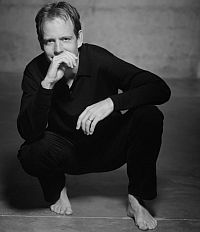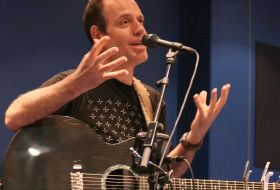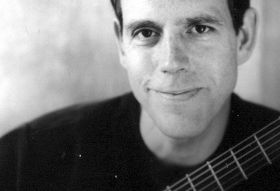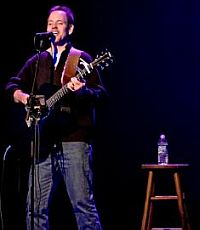|
 Boston Beats: Please state your name, age and occupation for the
record please. Boston Beats: Please state your name, age and occupation for the
record please.
David Wilcox: (laughs) I'm David Patrick Wilcox. I'm 50 years
old and I am a musician.
BB: How did you first start playing music for other people?
David: Well, there are songs that saved my life. They would give
me a glimpse of how it would be to feel more like me. They would
show me a way of seeing, a way of imagining my place here, that
was fun and full of wonder. So when I would hear a song that
would make me feel like that, I would just listen to it over and
over and over. And sometimes that listening was playing a little
riff on a guitar from a song that moved me. And I did consider
it listening. Not wanting to control the instrument, but wanting
it to move me. And so, you know, I did that for hours and hours,
and gradually you get better. Then there was a time when some of
those songs I first learned stopped moving me so deeply, but I
discovered that if I played them for other people, it made them
brand new.
BB: Like seeing a movie you've already seen with someone who
hasn’t seen it yet.
David: Yes.
BB: How did you start singing?
David: When I first started playing guitar and I’d ask other
people to sing. I didn't sing, 'cause I had no voice. I was sure
I had no voice, and so I was right. And then it started
happening that people would say, no, I don't know that song, or
remind me of the third verse, no, you sing the melody, I forget.
And I'd say, well I don't sing, and they'd say, well can you
just show me the melody? Can you just make that sound? And I'd
say okay, but I'm not singing, I'm just showing you the melody.
And then one night when I was playing – this was still when I
was like 18, 19 years old – I was in the lobby of the science
building at college, which had really echoey, big, high cement
walls. I was listening to this sound that comes out when I open
my mouth, and I was experimenting with all kinds of different
ways of making sounds. 'Cause at first, when you sing, you try
to sing like the record. But then there was this one sound that
came out that sounded really different. I'd never heard it
before. It was somehow... natural, and comfortable, and easy,
and it somehow felt like I was listening to the real me. It was
MY voice, but SINGING, and it felt like I was able to hear this
part of me, this glimpse, this little crack in the wall where
the light
 shines through. I was able to get this little glimpse
of, wow, THAT sounds like what it would be like to somehow be a
singer, and still be me. Not to be imitating, not to be
approximating, no affectation, just me. So, from that night I
would practice making these sounds that made my heart feel
right. I was still learning other people's songs, and I was so
in love with the way music would grab me. shines through. I was able to get this little glimpse
of, wow, THAT sounds like what it would be like to somehow be a
singer, and still be me. Not to be imitating, not to be
approximating, no affectation, just me. So, from that night I
would practice making these sounds that made my heart feel
right. I was still learning other people's songs, and I was so
in love with the way music would grab me.
SONGWRITING
BB: How did you first start writing songs?
David: There'd be a song where the first verse would just take
me there, and the chorus would have this perspective that would
just give me this sense of wonder. And a lot of times I would
get to the third verse and it didn't feel as strong somehow,
like the third verse somehow lost me. And so, I would either not
sing it, or I would change a few words so that I could make it
real, for me. I would make it so that I could really understand
it, and sing it in a way that meant something. 'Cause there was
this weird thing that happened with my voice, where if I really
believed what I was singing, I could open my throat and my voice
would actually make a good sound. But if I tried to sing
something that I didn't get, that sounded like it was somebody
else's words, my voice would actually sort of tighten. It would
not sound the same, it didn't sound right. And so at first I
thought, well that's a problem with my voice and I need to fix
that. And then I realized no, it's probably a truth-detector. I
would want whatever I was singing to be true, so that I could
sing it right. So I would start changing other people's songs,
and at first it felt like I was changing them just a little, but
there were some songs that there was a part of it that I really
loved, and I would sing that one part, maybe it was just the
chorus, and I would have to make up my own verses. And I
realized I was graffiti-ing paintings. I was changing other
people's works of art, and I thought, if it's so crucial for me
to be singing what I really believe, what I feel to be true,
then maybe I need to speak my own words. So I started writing
songs.
 BB: How do you think about songwriting? BB: How do you think about songwriting?
David: Sometimes I write a song and it feels like a powerful
transmission from some distant place. I mean, a guitar is just a
little empty box with strings on it. There's nothing in the box.
And it's even got a hole in it. But hearts are made that way,
kind of empty, with the hole. All the better to resonate. But
the more I would play with this little dimestore toy, and see
how it lined itself up with the things that felt truest in my
heart, I decided, what else can I trust? So these songs would
come to me and I would be so moved, and I would say I'll follow
you – follow like you follow a compass. But the song, the music,
is not the destination. You don't wanna end your hike standing
on your compass. The world doesn't need another song. But
somehow if my heart is discerning this secret language, if I
could subtly choose between lines that were good and lines that
were better, I could gradually craft a song that could take me
to a place I'd never been. And then I would read that map, and
try to find that place.
BB: What’s your process for writing songs?
David: First of all, the job of any creative person is to live a
life worth singing about. Output equals input. My job is to be
inspired. So I go to inspiring places, and I talk to inspiring
people, and I read inspiring books, and I just follow where my
heart comes alive. And that's the biggest part, and that's
really the most necessary part. When I feel inspired, when there
is an idea that stirs my soul and moves me, that pulls at my
heart, I concentrate on the feeling. I get a glimpse, maybe it's
just when I'm playing the guitar one day, and some little riff
will come in. It somehow tugs at my heart and asks me, don't you
remember? Don't you remember what feels like this? And as you
gather more memories, more associations, more stories, more
feeling, that have this same emotional center, gradually those
things start having kind of a gravity of their own. In other
words, my emotion will come into form, in these analogous
patterns of melody and rhythm that embody this emotion. And I
love the whole process because it feels to me like, when the
song is over, that what I'm left with is kind of like a
sketching that shows up on paper when you lightly brush a pencil
while you hold the paper up against some carved stone. Yeah, it
transfers, and you can read the symbols, but you don't have the
thing itself. You're not at the grave, you're not at the
monument, you're not touching it anymore. What you're left with
is a flimsy little piece of paper. But the process, the actual
going there, the actual tracing and feeling the physical
imprinting, that's the writing process. And that has much more
to do with the actual real thing than just the flimsy transfer
that shows up on the piece of paper, which is the song when
you're done.
RECORDING
BB: When you go into a studio, what do you do to try to get your
best stuff down?
David: Through the whole recording process, I'm picturing one
person hearing the song for the first time. It's tedious fun,
but every time you're working on a particular song, whether
you're actually making sound, mixing, or adding certain effects
or textures, you always have to come to the song with the same
heart, the same intent, the same message, that you're sending
through to that one listener. All the extra overdubs and
arranging, the mixing and mastering and all that stuff.
Everything you do is orchestrated by that intent.
BB: Do you prefer the studio, or playing out?
David: It's both. It's very different. Sort of like in-breath
and out-breath, you know, you can't say which one you prefer
'cause it really takes both to stay alive. The expression of
performance is great, the inspiration of writing and recording
is great, and they definitely need each other.
PLAYING OUT
BB: What are your favorite types of shows to play?
David: I think that the challenging nights are probably my
favorite. I had a gig a few weeks ago in Buford, Georgia, that
was a really tough room. The design of the room was not
conducive to music at all, there was no emotional focus. It had
a lot of distractions, and this whole other wing where there was
the bar, and there were people who couldn't hear because the
sound system wasn't great. They were too far away to see, so
there was talking. It could have been a terrible gig. And I came
to realize, here's an opportunity. So, I came up to that
opportunity and transformed that setting into a perfect place,
and played with it, not against it. Really harmonized my heart
to all those elements there, and somehow communicated that,
gradually, to the people there. And so I was able to show up, be
with what is, and play with that. And that made it the best gig
I've ever done. It was really fun.
NEXT SECTION
*Pictures courtesy of http://www.davidwilcox.com |